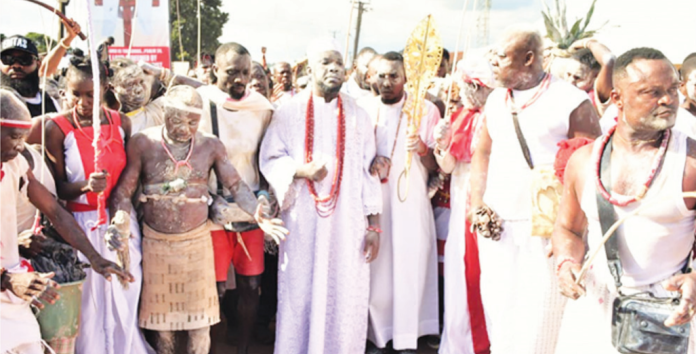THE Ubulu-Uku Iwu festival 2025, a grand celebration of its rich heritage was held recently. A visible presence was Chief James Asika Ibori Onwordi, the Onishe Ezemu of Ubulu-Uku kingdom.
The first two days was marked with vibrant displays of tradition, culture and unity, with the Onishe coming out in grand style alongside other traditional chiefs to perform his duties as the traditional prime minister of the kingdom.
The festival showcased culture at its peak, as indigens soaked themselves in mud and white chalk dancing with the Onishe Ezemu all around the community.
With drummers and praise singers chanting songs amid excitements to celebrate Iwu festival.
Speaking with The Pointer, the Onishe Ezemu, Chief James AsikaIbori Onwordi, disclosed that the festival is one of the numerous annual festivals celebrated within the Anioma region, Iwu festival is Ubulu-Uku Christmas celebration, he said.
According to him, Iwu festival is a festival of peace, unity and harmony among the people of Ubulu-Uku in Aniocha South of Delta State. It is usually celebrated annually every October with so much merriments and fun.
No wonder this year’s celebration was indeed great as the Onishe Ezemu fully participated in the ceremony joining his quarter to pay homage and dance to the Ezeiwu Shrine.
According to him, various clans, which include Udo, Agbonta, Onitcha, Ogbe-Ego Abu Edo, Aku and Isho quarters, usually dance with their followers screaming “Iwu! Iwu! Iwu! at the Ezenmor shrine He said that Iwu celebration is a period of reconciliation and peace and that is why the people of Ubulu-uku Kingdom can’t wait to celebrate the festival every October.
Like other festivals, Iwu is a communal festival with carefully planned programme and high revelry. It lasts for some days and its celebration mostly involves adult and youths who engage in deep rooted cultural display.
It is generally believed that as typical of other festivals, Iwu may have evolved based on communal efforts to placate forces and allow fruitful existence of man. It is also a festival associated with planting and harvest times.
According to the Onishe, Iwu comes with unique songs and dance-steps which are rarely sung on normal days and every quarter in Ubulu-Uku comes in a group with their leaders singing and dancing to tunes composed by them.
Major musical instruments are “Agogo” (small gong), Ekwe and Akpele (native flute). Not only does Iwu go with these traditional musical instruments, it also has a tune inimitable to it.
Principal characters of the festival are Ohene (Chief Priest), three Eze-Iwu and Enem. Ohene appears in small, plain white fabric called Akwa-Ocha covering his waist with a white feather strapped to his head while the Eze-Iwus and Enem appear in red attire.
Ohene’s body is robbed with white native chalk called “Nzu” in local parlance.
These characters need to be beautiful dancers and entertain the crowd. Iwu Festival of Ubulu-Uku presents the opportunity to pay great indigenes, visits and applaud them for the wonderful deeds rendered to the town; this is done with the symphony of songs.
It is also the period to compose traditional songs to ridicule the defaulters of the norms and traditions of the society no matter their position in the society. In ancient times, Iwu was a social means of exposing evils committed by natives and other inhabitants of the town believed to be clandestine. Such evils were publicly chanted round the town as celebrants move in groups.
The celebrants of Iwu in Ubulu-Uku observe certain traditional rules within which the festival must be celebrated. Indigens are for instance, not allowed to wear foot-wears while celebrating the festival.
To the people of Ubulu-Uku, Iwu ground is a sacred place that must remain sanctified throughout the celebration of the festival.
It is therefore considered an act of sacrilege to cover one’s feet while celebrating the festival at any given time.
Native chalks are also held sacred in the land and must be rubbed on every part of the body particularly at the time of celebrating the festival.
Traditional wrestling also importantly features in Ubulu-Uku celebration of Iwu. Challenges are openly thrown to enemies for a friendly wrestling match to test their strength.


